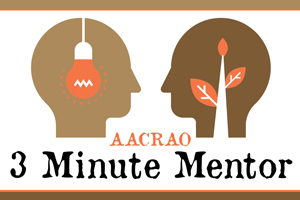
"3-Minute Mentor" is an occasional Connect column delivering bite-size career advice from higher education leaders, writers, and researchers. If you or someone you know can offer insightful professional development tips, please contact the Connect editor.
Paul Singh, Admissions Counselor at Rowan University, sums up his career trajectory in these three words: “I was hungry.”
So how did he go from working blue collar jobs to working in higher education? Singh attributes his career success to a good work ethic and humble attitude of appreciation. These two traits, Singh says, helps him immeasurably in his day to day dealings with students. To others who aspire to professional growth, Singh offers these tips:
Develop and demonstrate a consistent work ethic. Having a work ethic means you believe in the intrinsic value of your work.
.jpg?sfvrsn=ddd3f3e9_2) “As a first gen student, there was a lot that I didn’t know,” Singh said. For example, a lack of knowledge about financial aid stymied him during his senior year of high school, sending him down a long-winding path of taxi driving, retail, and warehouse jobs. Singh laughs as he recalls working double duty shifts, attributing his energy and appreciation for his current work to the perspective he gained from the challenges in his past.
“As a first gen student, there was a lot that I didn’t know,” Singh said. For example, a lack of knowledge about financial aid stymied him during his senior year of high school, sending him down a long-winding path of taxi driving, retail, and warehouse jobs. Singh laughs as he recalls working double duty shifts, attributing his energy and appreciation for his current work to the perspective he gained from the challenges in his past.
His catalyst for breaking out of his laborious cycle was the 2008 recession, where his family lost their jobs and house. In response, Singh refocused his energy and enrolled in Middlesex County College, ten years post-high school.
Looking to give back to his school, he began working as a federal work study student, kick-starting what has become a career in higher education. His motivation for working in higher education was fueled his supervisor at Middlesex County College, Pamela Hedberg. Hedberg gave him his official opportunity to work as a Scholarship Program Coordinator, and supported him with the opportunity of a lifetime. In the face of setbacks, Singh said, it's important to “take the initiative and be entrepreneurial,” even in small projects, and to capitalize on the opportunities in front of you.
Listen, and place the students’ needs first. Singh has a businesslike approach to working in institutions when it comes to finance and personnel management, but cultivates empathy when dealing with students. As a first gen college student himself, he understands what students need, even if they don’t know it themselves; when listening to the students’ needs, assisting students becomes easier and you build long lasting relationships with the students and their families.
Remember your own student experience, he advised, and let communication develop organically. He approaches each student like they are the high school version of himself, helping them lay down the groundwork for a future career. Study abroad, undergraduate research, internships--Singh recommends them all for every student to build their own portfolio.
“And, if the student isn’t a fit at the institution, I tell them to explore other institutions,” he says bluntly.
Don't take it for granted. “Enjoy your work and be grateful,” Singh advises. After all, even on the hard days, the work is rewarding, and you have the chance to make a difference, he said. Don't doubt the power you have to change students’ lives.